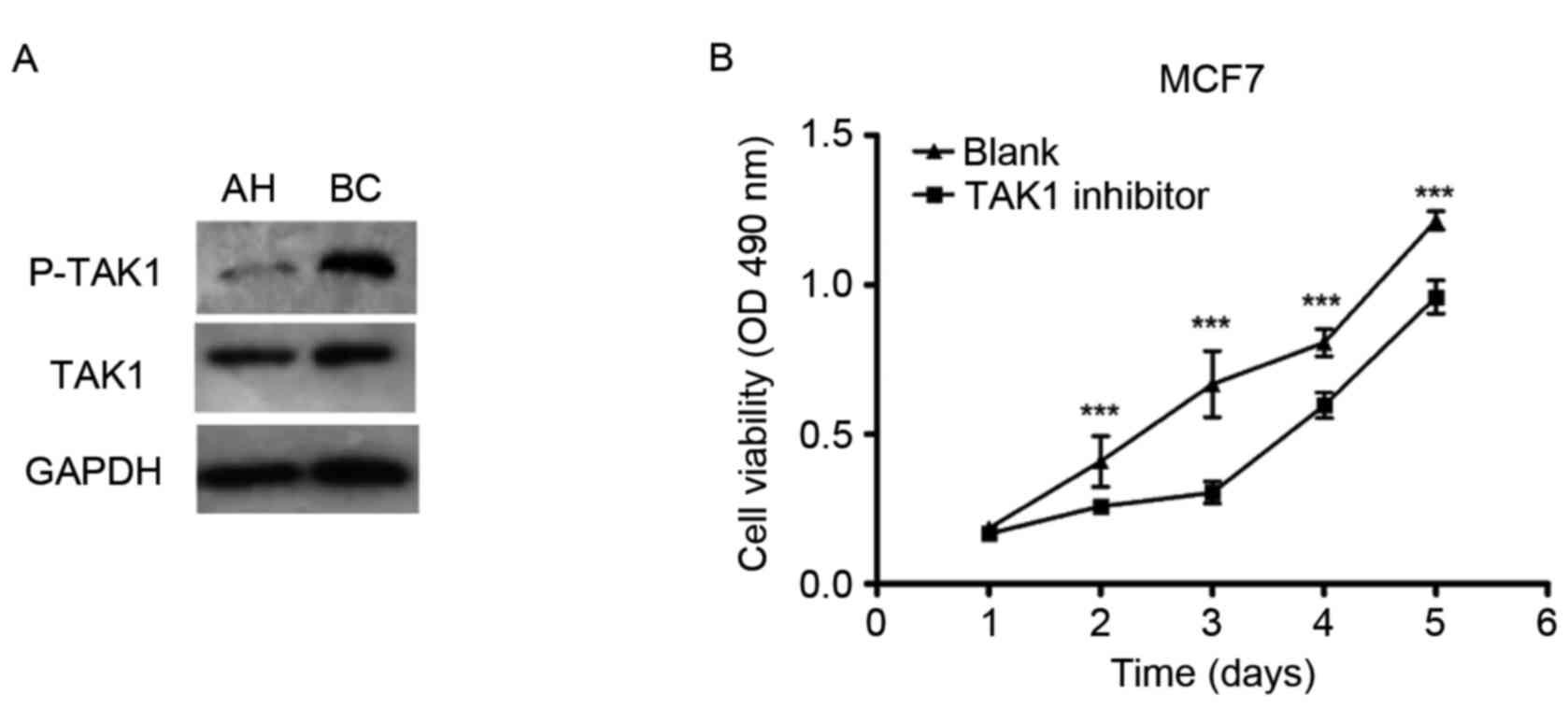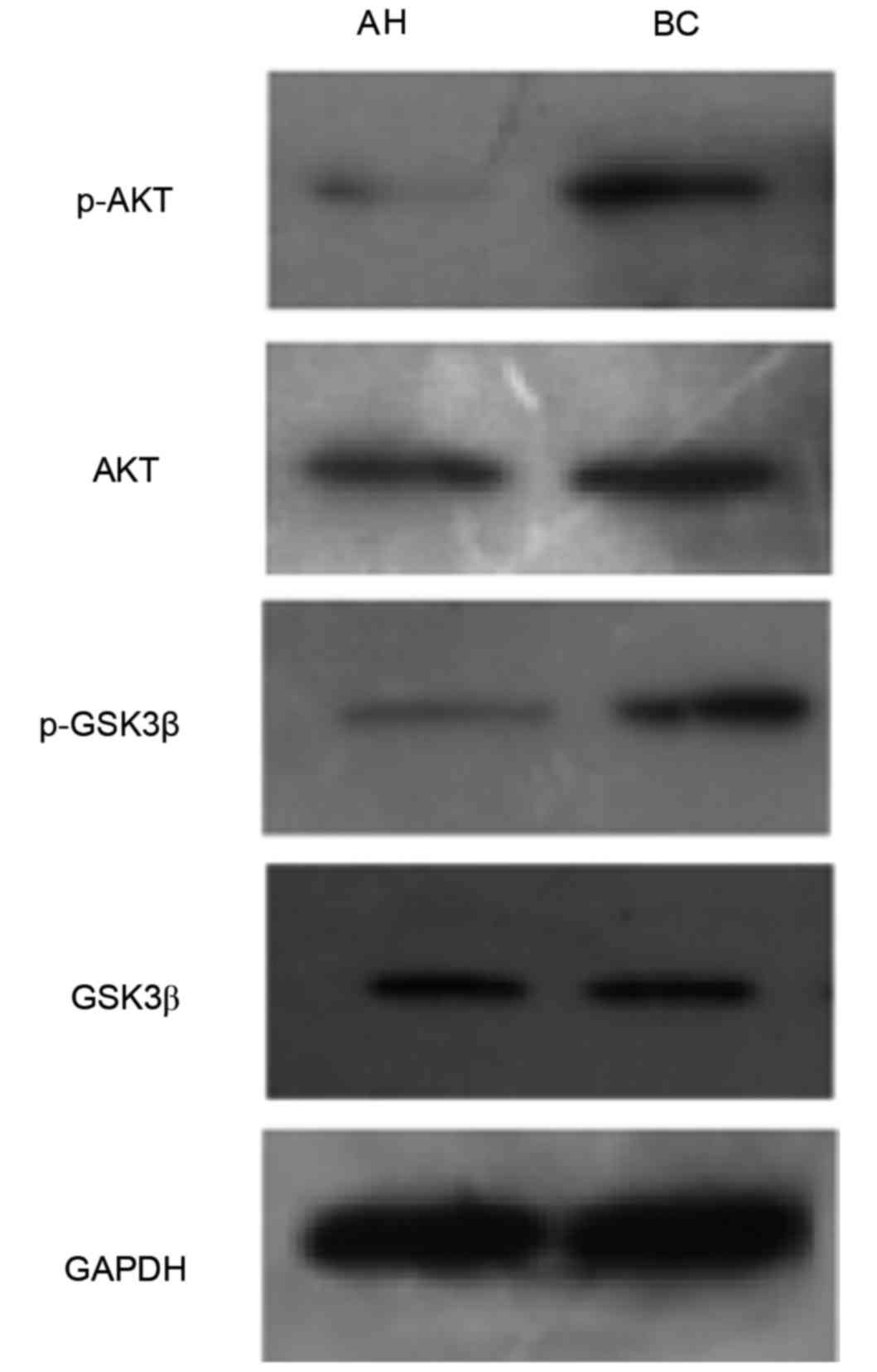|
1
|
Siegel RL, Miller KD and Jemal A: Cancer
statistics, 2016. CA Cancer J Clin. 66:7–30. 2016. View Article : Google Scholar : PubMed/NCBI
|
|
2
|
den Hollander P, Savage MI and Brown PH:
Targeted therapy for breast cancer prevention. Front Oncol.
3:2502013. View Article : Google Scholar : PubMed/NCBI
|
|
3
|
Independent UK Panel on Breast Cancer
Screening: The benefits and harms of breast cancer screening: An
independent review. Lancet. 380:1778–1786. 2012. View Article : Google Scholar : PubMed/NCBI
|
|
4
|
Li Y, Li L, Lin J, Hu X, Li B, Xue A, Shen
Y, Jiang J, Zhang M, Xie J and Zhao Z: Deregulation of RGS17
expression promotes breast cancer progression. J Cancer. 6:767–775.
2015. View Article : Google Scholar : PubMed/NCBI
|
|
5
|
Bradley JR and Pober JS: Tumor necrosis
factor receptor-associated factors (TRAFs). Oncogene. 20:6482–6491.
2001. View Article : Google Scholar : PubMed/NCBI
|
|
6
|
Lee NK and Lee SY: Modulation of life and
death by the tumor necrosis factor receptor-associated factors
(TRAFs). J Biochem Mol Biol. 35:61–66. 2002.PubMed/NCBI
|
|
7
|
Chung JY, Park YC, Ye H and Wu H: All
TRAFs are not created equal: Common and distinct molecular
mechanisms of TRAF-mediated signal transduction. J Cell Sci.
115:679–688. 2002.PubMed/NCBI
|
|
8
|
Inoue J, Gohda J and Akiyama T:
Characteristics and biological functions of TRAF6. Adv Exp Med
Biol. 597:72–79. 2007. View Article : Google Scholar : PubMed/NCBI
|
|
9
|
Ishida T, Mizushima S, Azuma S, Kobayashi
N, Tojo T, Suzuki K, Aizawa S, Watanabe T, Mosialos G, Kieff E, et
al: Identification of TRAF6, a novel tumor necrosis factor
receptor-associated factor protein that mediates signaling from an
amino-terminal domain of the CD40 cytoplasmic region. J Biol Chem.
271:28745–28748. 1996. View Article : Google Scholar : PubMed/NCBI
|
|
10
|
He Z, Huang C, Lin G and Ye Y:
siRNA-induced TRAF6 knockdown promotes the apoptosis and inhibits
the invasion of human lung cancer SPC-A1 cells. Oncol Rep.
35:1933–1940. 2016.PubMed/NCBI
|
|
11
|
Huang HL, Chiang CH, Hung WC and Hou MF:
Targeting of TGF-β-activated protein kinase 1 inhibits chemokine
(C-C motif) receptor 7 expression, tumor growth and metastasis in
breast cancer. Oncotarget. 6:995–1007. 2015. View Article : Google Scholar : PubMed/NCBI
|
|
12
|
Li L, Wang X, Chen W, Qi H, Jiang DS,
Huang L, Huang F, Wang L, Li H and Chen X: Regulatory role of CARD3
in left ventricular remodelling and dysfunction after myocardial
infarction. Basic Res Cardiol. 110:562015. View Article : Google Scholar : PubMed/NCBI
|
|
13
|
Livak KJ and Schmittgen TD: Analysis of
relative gene expression data using real-time quantitative PCR and
the 2(−Delta Delta C(T)) method. Methods. 25:402–408. 2001.
View Article : Google Scholar : PubMed/NCBI
|
|
14
|
Li L, Chen W, Zhu Y, Wang X, Jiang DS,
Huang F, Wang L, Xiang F, Qin W, Wang Q, et al: Caspase recruitment
domain 6 protects against cardiac hypertrophy in response to
pressure overload. Hypertension. 64:94–102. 2014. View Article : Google Scholar : PubMed/NCBI
|
|
15
|
Zhong L, Cao F and You Q: Effect of TRAF6
on the biological behavior of human lung adenocarcinoma cell.
Tumour Biol. 34:231–239. 2013. View Article : Google Scholar : PubMed/NCBI
|
|
16
|
Yao F, Han Q, Zhong C and Zhao H: TRAF6
promoted the tumorigenicity of esophageal squamous cell carcinoma.
Tumour Biol. 34:3201–3207. 2013. View Article : Google Scholar : PubMed/NCBI
|
|
17
|
Bilir C, Engin H, Can M, Likhan S,
Demirtas D, Kuzu F and Bayraktaroglu T: Increased serum tumor
necrosis factor receptor-associated factor-6 expression in patients
with non-metastatic triple-negative breast cancer. Oncol Lett.
9:2819–2824. 2015.PubMed/NCBI
|
|
18
|
Peng Z, Shuangzhu Y, Yongjie J, Xinjun Z
and Ying L: TNF receptor-associated factor 6 regulates
proliferation, apoptosis, and invasion of glioma cells. Mol Cell
Biochem. 377:87–96. 2013. View Article : Google Scholar : PubMed/NCBI
|
|
19
|
Liu H, Tamashiro S, Baritaki S, Penichet
M, Yu Y, Chen H, Berenson J and Bonavida B: TRAF6 activation in
multiple myeloma: A potential therapeutic target. Clin Lymphoma
Myeloma Leuk. 12:155–163. 2012. View Article : Google Scholar : PubMed/NCBI
|
|
20
|
Adhikari A, Xu M and Chen ZJ:
Ubiquitin-mediated activation of TAK1 and IKK. Oncogene.
26:3214–3226. 2007. View Article : Google Scholar : PubMed/NCBI
|
|
21
|
Sorrentino A, Thakur N, Grimsby S,
Marcusson A, von Bulow V, Schuster N, Zhang S, Heldin CH and
Landström M: The type I TGF-beta receptor engages TRAF6 to activate
TAK1 in a receptor kinase-independent manner. Nat Cell Biol.
10:1199–1207. 2008. View
Article : Google Scholar : PubMed/NCBI
|
|
22
|
Xiao F, Wang H, Fu X, Li Y and Wu Z: TRAF6
promotes myogenic differentiation via the TAK1/p38
mitogen-activated protein kinase and Akt pathways. PLoS One.
7:e340812012. View Article : Google Scholar : PubMed/NCBI
|
|
23
|
Chung JY, Lu M, Yin Q, Lin SC and Wu H:
Molecular basis for the unique specificity of TRAF6. Adv Exp Med
Biol. 597:122–130. 2007. View Article : Google Scholar : PubMed/NCBI
|
|
24
|
Yoon K, Jung EJ and Lee SY: TRAF6-mediated
regulation of the PI3 kinase (PI3K)-Akt-GSK3beta cascade is
required for TNF-induced cell survival. Biochem Biophys Res Commun.
371:118–121. 2008. View Article : Google Scholar : PubMed/NCBI
|
|
25
|
Wikman H and Kettunen E: Regulation of the
G1/S phase of the cell cycle and alterations in the RB pathway in
human lung cancer. Expert Rev Anticancer Ther. 6:515–530. 2006.
View Article : Google Scholar : PubMed/NCBI
|
|
26
|
Vincenzi B, Schiavon G, Silletta M,
Santini D, Perrone G, Di Marino M, Angeletti S, Baldi A and Tonini
G: Cell cycle alterations and lung cancer. Histol Histopathol.
21:423–435. 2006.PubMed/NCBI
|
|
27
|
Gugger M, Kappeler A, Vonlanthen S,
Altermatt HJ, Ris HB, Lardinois D, Borner MM, Heighway J and
Betticher DC: Alterations of cell cycle regulators are less
frequent in advanced non-small cell lung cancer than in resectable
tumours. Lung Cancer. 33:229–239. 2001. View Article : Google Scholar : PubMed/NCBI
|
|
28
|
Wang CD, Yuan CF, Bu YQ, Wu XM, Wan JY,
Zhang L, Hu N, Liu XJ, Zu Y, Liu GL and Song FZ: Fangchinoline
inhibits cell proliferation via Akt/GSK-3beta/ cyclin D1 signaling
and induces apoptosis in MDA-MB-231 breast cancer cells. Asian Pac
J Cancer Prev. 15:769–773. 2014. View Article : Google Scholar : PubMed/NCBI
|
|
29
|
Liao K, Li J and Wang Z:
Dihydroartemisinin inhibits cell proliferation via
AKT/GSK3β/cyclinD1 pathway and induces apoptosis in A549 lung
cancer cells. Int J Clin Exp Pathol. 7:8684–8691. 2014.PubMed/NCBI
|

















